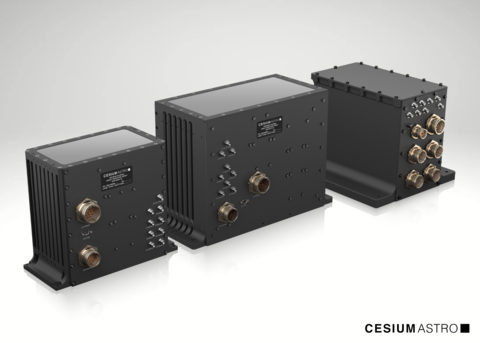CesiumAstro Selected by Rocket Lab to Provide Multi-Beam Ka-Band Communications Payloads for its Space Development Agency Tranche 2 Transport Layer Constellation
CesiumAstro has been selected by Rocket Lab to provide its Vireo active electronically scanned array (AESA) radio frequency (RF) communications payload for integration on 18 space vehicles supporting the Space Development Agency’s Tranche 2 Transport Layer. The payload, launching in mid-2027, will be the first multi-beam-capable Ka-band communications system operating in the Proliferated Warfighter Space Architecture (PWSA), delivering secure, low-latency communications and missile tracking capabilities for the U.S. Department of Defense.
CesiumAstro's Vireo payload is the culmination of over seven years of research, development, testing, and manufacturing, showcasing advanced single- and multi-beam capabilities.
The Vireo system's mass-manufacturable design and configurable architecture allow for rapid deployment with maximum flexibility, compatible with various defense and commercial missions.
- None.

CesiumAstro’s Vireo payload is comprised of three distinct units: a receive antenna, a transmit antenna, and a reconfigurable processing unit (from left). Image courtesy: CesiumAstro
CesiumAstro’s Vireo payload is the culmination of more than seven years of the company’s AESA research, development, testing, and manufacturing. A receive antenna, transmit antenna, and SpaceVPX form-factor reconfigurable processor enable powerful single- and multi-beam operation.
“Our Vireo system’s multi-beam capability doesn’t just meet the needs of the warfighter but exceeds them. This cutting-edge technology will be a force multiplier for every branch of the Department of Defense,” said Shey Sabripour, Founder and CEO of CesiumAstro. “We are honored to be selected by Rocket Lab to deploy CesiumAstro’s active phased array technology and help to defend America’s national security interests.”
Rocket Lab’s 18 satellites are part of the T2TL Beta Program, which features multiple SV and mission configuration variants fielded to provide global communications access and deliver persistent regional encrypted connectivity in support of warfighter missions. When fully operational, the Transport Layer constellation will include hundreds of SVs operating in low-Earth orbit, including 90 total Beta Program configurations.
“We’re pleased to be flying the CesiumAstro Vireo communications payload,” said Rocket Lab’s Vice President of Space Systems, Brad Clevenger. “This mission will be a significant demonstration our spacecraft’s ability to support diverse applications in low-Earth orbit. The Vireo system’s advanced single- and multi-beam capabilities perfectly align with our Pioneer bus, showcasing the technological advancements we’re enabling.”
Compatible with many different defense and commercial missions, the Vireo payload’s mass-manufacturable design and configurable architecture allow for rapid deployment with maximum flexibility.
About CesiumAstro
Headquartered in
About Rocket Lab
Founded in 2006, Rocket Lab is an end-to-end space company with an established track record of mission success. We deliver reliable launch services, satellite manufacture, spacecraft components, and on-orbit management solutions that make it faster, easier, and more affordable to access space. Headquartered in
View source version on businesswire.com: https://www.businesswire.com/news/home/20240507457731/en/
Media Contact
Aimée Ahiers, media@cesiumastro.com
Source: CesiumAstro
FAQ
What is CesiumAstro's role in the Rocket Lab project?
What is Rocket Lab's Tranche 2 Transport Layer constellation about?
When will the payload launch?
What are the key features of CesiumAstro's Vireo payload?







